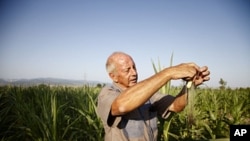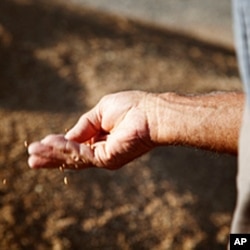A South African court on September 12 convicted Julius Malema, president of the African National Congress Youth League, of hate speech for singing "shoot the Boer, kill the Boer" at a rally last year. But some Boers (white South African farmers) say they have had enough of violence and racial tension in South Africa and are planning to move out. VOA's James Brooke visited one Afrikaner who started farming this year in the former Soviet Republic of Georgia.
Piet Kemp's family farmed in southern Africa for three centuries. But now at age 66, this Afrikaner farmer has traded South Africa's Eastern Transvaal for Eastern Georgia. Here, he is reviving wheat and corn production on what was once a Soviet collective farm. Kemp says he has no regrets.
"I have a new life here," he explained. "I try to make friends with all the people in Georgia, learning their culture. I have been here since 3rd of March, and I have not heard of one murder in Georgia in this time. I didn't hear about any bank robbery. I didn't hear about any one hijacking."
It was not just high crime rates that prompted Kemp to leave South Africa.
"There is no security of land, absolutely no security of land in South Africa," he stressed.
Kemp said that over the last decade he successfully helped hundreds of white farmers hold on to their farmland in face of legal challenges from black farm workers and squatters. But now, he says white farmers face threats of farm seizures by ANC Youth League President Julius Malema and other politicians.
"With a youth leader like Malema, he can go up and stand and say to anyone I want this land for South Africa, for the future of South Africa," noted Kemp. "He can take just what he wants. For me, I just say no."
The Bill of Rights in South Africa’s 1996 post-apartheid constitution protects land ownership rights, stipulating restitution for land that is redistributed. This law, defenders say, has limited land expropriations. A two-thirds vote in parliament is needed to change the constitution, a majority the ruling ANC does not have.
Georgia is playing on these insecurities, actively recruiting Afrikaner farmers to help revive the nation's moribund agriculture. In the 20 years since the collapse of the Soviet Union, half of Georgia's farmland has gone out of production.
"They have done exceptionally great job over the years in South Africa, and to give them an opportunity to do the same thing here and for Georgian farmers to learn from the experience they will receive from their new neighbors, from the South African farmers," said Georgia's Canada-educated Economy Minister, Vera Kobalia.
Kobalia praises Sandra Roelofs, the Dutch-born wife of Georgian President Mikhail Saakashvili, for promoting the program. Dutch is the mother language of Afrikaans.
"It helped in terms of making them feel more secure in Georgia," Kobalia noted. "There is definitely that connection, the Holland connection in Georgia."
"Sandra, she was touring a week with us," said Kemp. "We pick[ed] grapes together. We spoke Netherlands."
Kemp is a devout Protestant and feels a strong connection to Georgia's overwhelmingly Christian Orthodox population.
"We believe in the same thing, believe in the same God," said Kemp.
Kemp says he and other Afrikaner pioneers feel welcome. But Mariam Jorjadze, who runs a farmers' aid organization, worries that the 10 Afrikaner families here now could lead to a big influx of foreign farm directors. As in the Soviet days, Georgian farmers could again be reduced to laborers on big industrial farms.
"If the trend will be many South Africa farmers coming and there will tendency to convert people in rural areas again into labor force for foreign investors, I don't think that this system is viable. It resembles the former Soviet system," said Jorjadze.
Kemp believes that Afrikaners will help jump start Georgian agriculture. But he cautions that they must integrate into Georgian society.
"We must go into Georgia as Georgians - in Georgian culture, in Georgian language - so that they see us as Georgians, not as South Africans coming to Georgia," Kemp explained.
Kemp adds that he does not want his new life in Georgia to be like his old life in South Africa, where he was part of a successful minority envied by the majority population.





